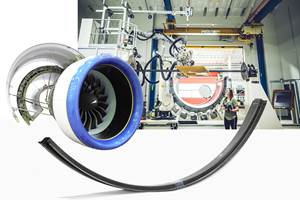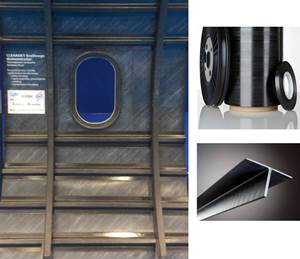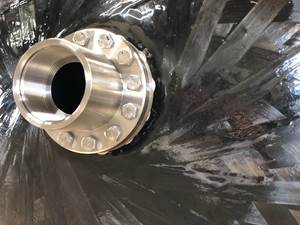SGL Automotive Carbon Fibers expands Moses Lake facility . . . again
BMW signals that it is serious about consuming carbon fiber for years to come as SGL Automotive Carbon Fibers expands its Washington production site to 9,000 tons per year.
Share
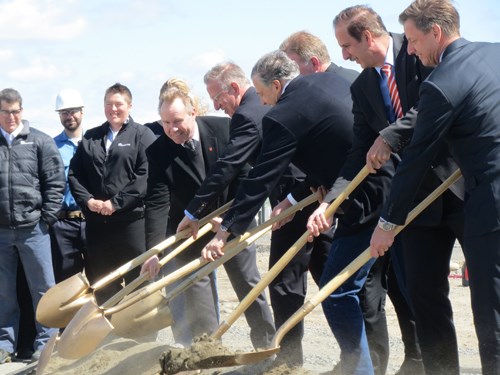
SGL ACF, BMW and Washington state officials break ground on the third building at the SGL ACF site in Moses Lake, Wash., USA. The building will house lines five and six, each 1,500 tons capacity, to bring the entire site up to 9,000 tons capacity by the end of 2015.
SGL Automotive Carbon Fibers (SGL ACF), a joint venture of carbon fiber manufacturer SGL Group (Wiesbaden, Germany) and automaker BMW Group (Munich, Germany), hosted corporate and government dignitaries on May 9 at its Moses Lake, Wash., USA, carbon fiber facility to announce a third expansion of the plant designed to increase output at the site to 9,000 tons per annum by the end of 2015.
The facility, first opened in 2011 with two 1,500-ton carbon fiber lines, makes 50k tow carbon fiber for the passenger cells (Life Module) of the BMW i3 all-electric passenger car and the i8 hybrid sports car. A subsequent expansion begun in 2013 will increase capacity this summer to 6,000 tons. A third building, on which officials broke ground on May 9, will add another 3,000 tons of carbon fiber production to the site by the end of 2015, creating what SGL ACF officials say is the largest single carbon production facility in the world.
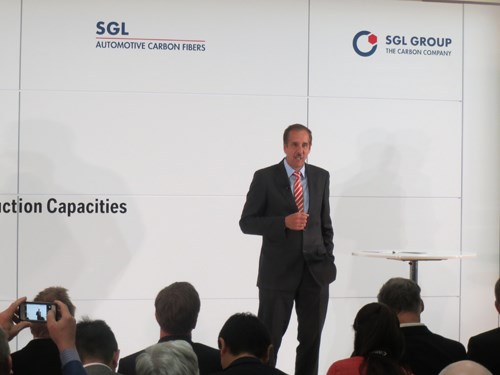
BMW Board of Management member Dr. Klaus Draeger.
Carbon fiber supply for the i Series is unique in the automotive and composites industry in that all aspects of carbon fiber production (from polyacrylonitrile manufacture to carbon fiber manufacture to weaving) is completely captive to the BMW supply chain. Thus, any expansion of the Moses Lake facility is seen as a strong sign of how much carbon fiber BMW intends to consume in the coming years.
The expansion is not a trivial one. It represents an investment of more than $200 million (USD) and signals to the carbon fiber and automaking markets that BMW is seriously committed to carbon fiber use not just in the i3 and i8, but other BMW vehicles as well. Dr. Klaus Draeger, member of the Board of Management of BMW, said at the groundbreaking that carbon fiber would be integrated into "other BMW model series," including in the M Series, which has sported a carbon fiber roof for the last decade. As for other vehicles, BMW officials at the event were not specific about which models might include carbon fiber except to note that "between the i3 and the i8 there are many numbers."
Draeger went to great lengths at the groundbreaking to thank SGL and the state of Washington for their cooperation and support, emphasizing in the process the “game-changing” nature of the i Series of vehicles. “BMW is not just about visionary vehicle concepts and mobility services. It represents a new dimension of sustainability and energy efficiency throughout the value chain. In other words, BMW i is a revolution in the automotive industry.”
Andreas Wüllner, CEO of SGL ACF, noted that “In the course of only four years, SGL Automotive Carbon Fibers has managed to become the world’s largest carbon fiber production site. The automotive industry will increasingly turn to CFRP [carbon fiber-reinforced plastic] because it is the material of the future.”
Washington governor Jay Inslee said the state was committing $150,000 in educational grants to help train a new crop of employees for the expanded plant in Moses Lake and emphasized his desire to create and foster a business climate that helps companies like SGL and BMW earn a profit, increase employment and help solve the energy and emissions challenges facing his state and the world. “We aim to make profits, put people to work and solve this problem,” he said. To the “pessimists and naysayers” who don’t believe humans need to act now to solve pollution and energy problems, he said, “Come to Moses Lake and join us optimists who know we can beat this problem.”
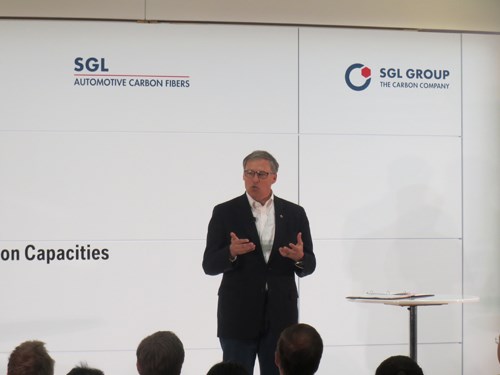
Washington state Governor Jay Inslee.
The Moses Lake site, in central Washington state, was originally chosen by SGL ACF for its proximity and access to relatively inexpensive electrical power provided by the Wanapum and Priest Rapids hydroelectric dams on the nearby Columbia River. The dams allow SGL ACF to bypass natural gas use entirely in carbon fiber manufacture, said Wüllner, which provides significant cost advantages.
Given the 60 acres of land SGL ACF owns in Moses Lake, and given the low cost of energy available there, the only question remaining is how many more times the site might be expanded in the coming years.
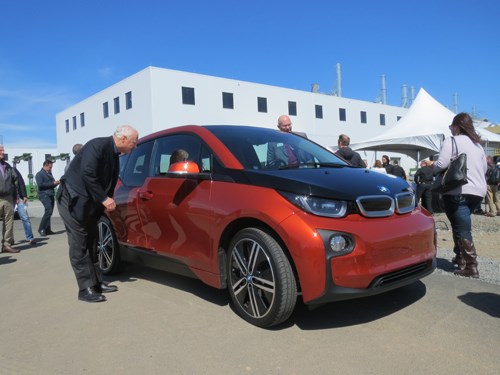
BMW all-electric i3 car, in front of the secon of two existing buildings at the SGL ACF site in Moses Lake.
Related Content
Combining multifunctional thermoplastic composites, additive manufacturing for next-gen airframe structures
The DOMMINIO project combines AFP with 3D printed gyroid cores, embedded SHM sensors and smart materials for induction-driven disassembly of parts at end of life.
Read MoreThe potential for thermoplastic composite nacelles
Collins Aerospace draws on global team, decades of experience to demonstrate large, curved AFP and welded structures for the next generation of aircraft.
Read MorePEEK vs. PEKK vs. PAEK and continuous compression molding
Suppliers of thermoplastics and carbon fiber chime in regarding PEEK vs. PEKK, and now PAEK, as well as in-situ consolidation — the supply chain for thermoplastic tape composites continues to evolve.
Read MoreInfinite Composites: Type V tanks for space, hydrogen, automotive and more
After a decade of proving its linerless, weight-saving composite tanks with NASA and more than 30 aerospace companies, this CryoSphere pioneer is scaling for growth in commercial space and sustainable transportation on Earth.
Read MoreRead Next
All-recycled, needle-punched nonwoven CFRP slashes carbon footprint of Formula 2 seat
Dallara and Tenowo collaborate to produce a race-ready Formula 2 seat using recycled carbon fiber, reducing CO2 emissions by 97.5% compared to virgin materials.
Read MorePlant tour: Daher Shap’in TechCenter and composites production plant, Saint-Aignan-de-Grandlieu, France
Co-located R&D and production advance OOA thermosets, thermoplastics, welding, recycling and digital technologies for faster processing and certification of lighter, more sustainable composites.
Read MoreDeveloping bonded composite repair for ships, offshore units
Bureau Veritas and industry partners issue guidelines and pave the way for certification via StrengthBond Offshore project.
Read More














